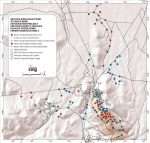(Bloomberg) — BHP Group and union leaders in Chile reached a preliminary wage agreement on Friday, setting the stage for a resumption of normal production at the world’s biggest copper mine. Prices dipped.
Most Read from Bloomberg
-
Boston’s Broke and Broken Transit System Hurts Downtown Recovery
-
A Floating Island in Baltimore Raises Hope for a Waterfront Revival
If ratified, the accord will end a stoppage that has disrupted production at a site accounting for about 5% of the world’s mined copper at a time of tightness in the supply of concentrate — the raw material used to feed smelters.
Leaders of the main union at the Escondida operation agreed to temporarily lift a strike in order to present the new proposal to their 2,400 members, according to company and union statements. If they accept, the two sides will sign a new labor contract. If they don’t, the strike will resume at 8 p.m on Sunday.
Escondida churns out more than 1 million metric tons a year, making it by far the biggest supplier of copper. The preliminary accord will come as a relief given the mine has been the scene of lengthy stoppages in the past, including a 44-day strike in 2017.
Workers downed tools Tuesday after failing to reach a wage deal with management in the obligatory phase of collective bargaining. Since then, the two sides have been engaged in on-again, off-again discussions. Negotiations dragged into the early hours of Friday before finally yielding a breakthrough. The proposal includes an immediate signing bonus of about $32,000 each, plus a more than $2,000 soft loan, according to people briefed on the matter.
Supply risks at Escondida have supported copper futures in recent days, but a modest decline in prices after the wage deal signaled that investors have not been betting heavily on a protracted stoppage.
“Strikes usually don’t tend to be long-lasting in Chile, and so the market may have been reluctant to react to it too much in the early stages,” Michael Widmer, head of metals research at Bank of America, said by phone. “The bigger issue right now is how we’re doing on the demand side, and that’s probably why the market hasn’t focused on it so much.”
Copper prices fell as much as 1.1% on the London Metal Exchange after the announcement, before paring declines to 0.4%. Still, the metal capped a weekly gain of 2.8%, breaking a five-week run of losses. Resilient US data this week helped to allay fears about a downturn in the world’s top economy.
–With assistance from Mark Burton and Paul-Alain Hunt.
(Adds details of deal in fifth paragraph)
Most Read from Bloomberg Businessweek
-
Inside Worldcoin’s Orb Factory, Audacious and Absurd Defender of Humanity
-
Surgeons Cut a Giant Tumor Out of My Head. Is There a Better Way?
-
New Breed of EV Promises 700 Miles per Charge (Just Add Gas)
-
Singapore's Wooden Building of the Future Has a Mold Problem
-
There’s a Gender Split in How US College Grads Are Tackling a More Difficult Job Market
©2024 Bloomberg L.P.





 Follow us on Twitter
Follow us on Twitter Become our facebook fan
Become our facebook fan










Comments are closed.